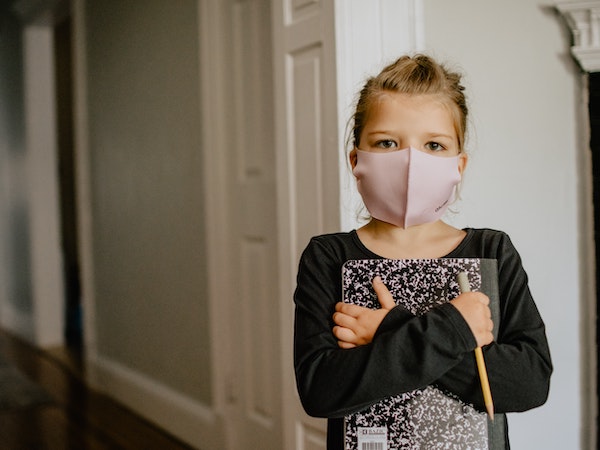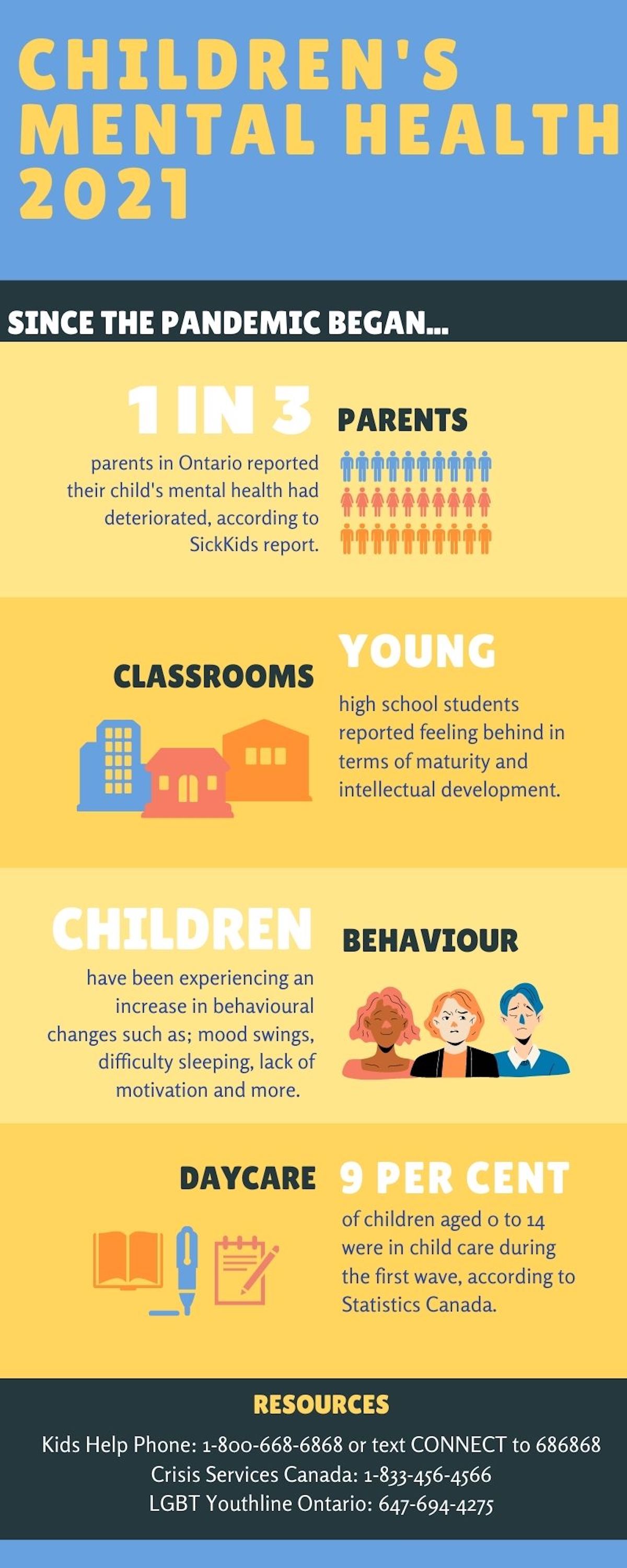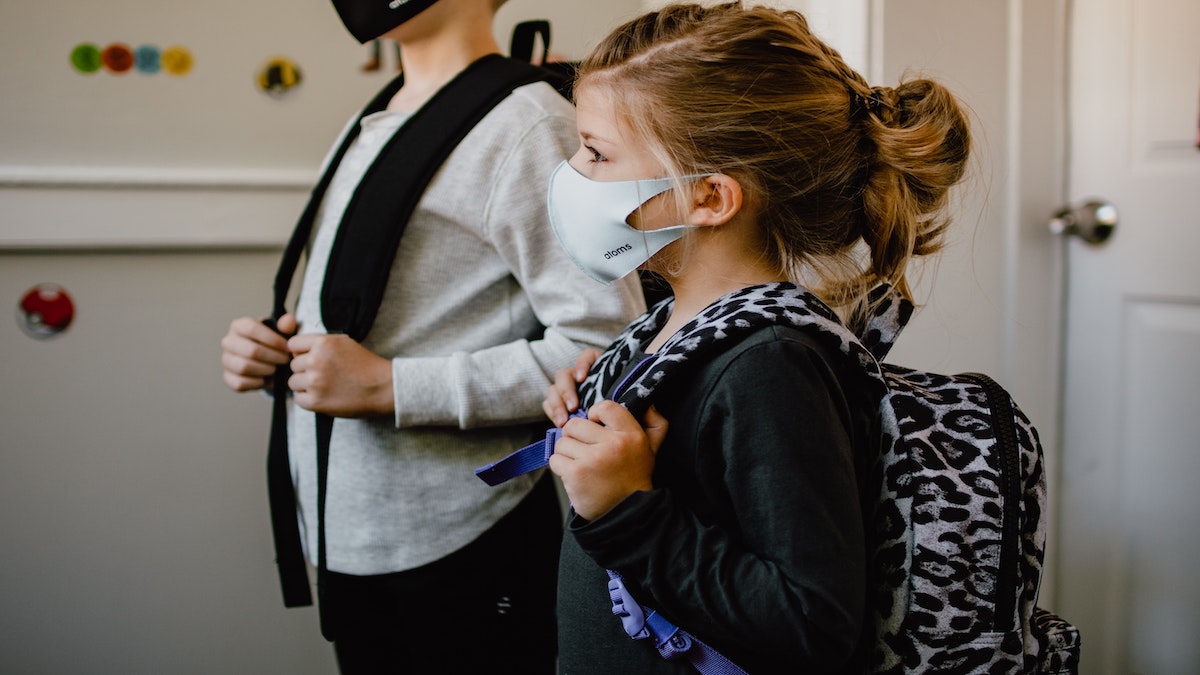After prolonged closure of schools, lack of socialization with friends and continued uncertainty about the future, a recent SickKids report shows one-third of Ontario parents say the mental health of their children has deteriorated since the first wave of the pandemic.
The report also found that “more than half of the parents noticed behavioural changes in their child. These ranged from drastic changes in mood, behaviour and personality, to difficulty sleeping and more.”
The report also found that those children with pre-existing mental health issues have been particularly affected. Experts have also observed an increase in depression, anxiety, substance abuse and suicidal behaviours.

“This is a really difficult time for children as a group,” said Sarah Bryson, a school social worker intern in Toronto. “Children are meant to not have to develop in an environment of stress. They are meant to have a relatively carefree learning experience. They aren’t typically expected to have this much responsibility.”
More specifically, children with special needs or adjusted learning needs are having a difficult time adapting to new restrictions. There has been an increase in agitation, frustration, crying and sadness, presenting significant mental health concerns, said Bryson.
“Elementary students — some of them don’t really understand what is going on right now. They’re aware that there’s something wrong with the world,” she said. “Understanding the complexity of the COVID-19 pandemic is something that is beyond their mental capability at this point in their development.”
Severe symptoms
She advises parents to look out for signs of severe symptoms of anxiety or panic such as hyperventilation, emotional outbursts, crying fits, changes in sleeping patterns, changes in eating habits, signs of depression such as frequent irritability towards minor inconveniences, withdrawal, or lack of motivation.
“Most of the time when kids experience anxiety, they feel it a lot in their gut,” Bryson said.
Experts have said that based on evidence emerging from the coronavirus pandemic, along with previous knowledge from other disease outbreaks, children and youth experience many related sources of distress.
“Children … learn by observing. If you constantly see mom and dad in a panic it’s very hard for you to remain calm,” said Bryson.
It can derive from fear of a family member, friend or themselves getting sick, social and economic impacts of quarantine, tensions in a household or feelings of uncertainty, according to a 2020 report from Children Mental Health Ontario.

“Parents should regularly discuss issues and allow their children to express themselves when needed,” said Amélie Ouellet, a resource teacher from Quebec, in an interview conducted in French. “They need to make their children aware of the importance of developing good work habits, supervise their children by setting a routine to get a good night’s sleep, and set parental controls for internet access.”
Ottawa home daycare provider Kathy Rowe said it is important to establish a consistent routine for parents who are working at home with younger children.
“Children are smarter than we give them credit for,” she said. “It won’t be easy, but it’s the world we live in … It’s all about the frame of mind. Kids will learn rather quickly what the pattern of the day is like. Patience is important.”
“Many children thrive on routine and structure,” said, Ryan Eikmeier, CEO of Helping Hands Daycare in Pickering, ON.
Eikmeier said he has not noticed any significant changes in behaviour of children at the daycare. They are able to go to class, play with their friend and go outside.
“With the exception of washing their hands more and their teachers wearing face-shields and masks, this is their sense of normal,” said Eikmeier. “They don’t have any other activities at the moment outside of childcare.”
The teachers and staff may be wearing face-shields and masks, but they have been using the PPE as a way to interact with the children. They decorate their masks, goggles and touchless thermometers.
“Childcare during this time and school for the older children is so important,” said Eikmeier. “The way that our society operates was never designed to have parents working at home full-time and to have children be at home full-time. I would say to parents that it’s OK to need help, it’s OK to need a place for your child to go.”
Resources:
● If you or anyone you know are in immediate danger call 9-1-1
● Kids Help Phone: 1-800-668-6868 or text CONNECT to 686868
● Children’s Mental Health Ontario Centres: cmho.org/findhelp/
● Crisis Services Canada: 1-833-456-4566
● LGBT Youthline Ontario: 647-694-4275




